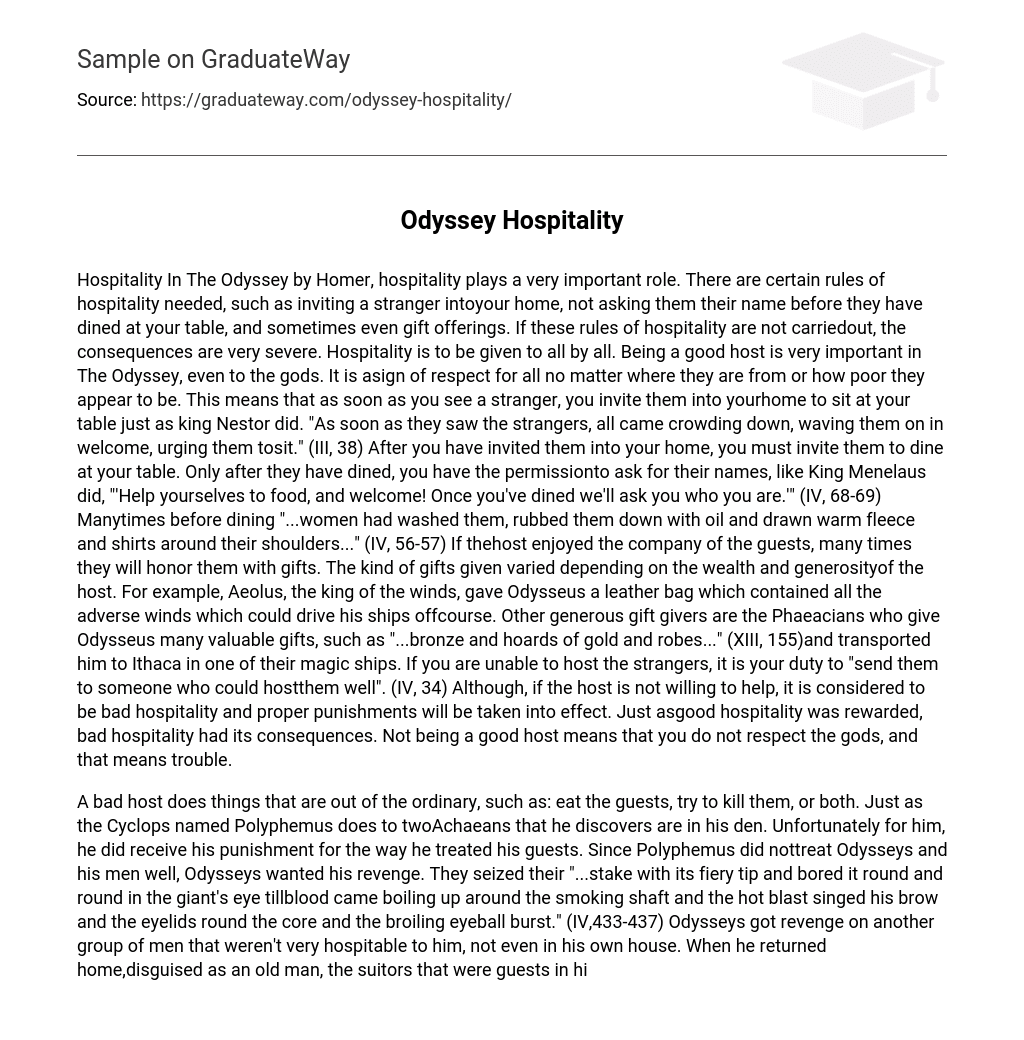Hospitality In The Odyssey by Homer, hospitality plays a very important role. There are certain rules of hospitality needed, such as inviting a stranger intoyour home, not asking them their name before they have dined at your table, and sometimes even gift offerings. If these rules of hospitality are not carriedout, the consequences are very severe. Hospitality is to be given to all by all. Being a good host is very important in The Odyssey, even to the gods. It is asign of respect for all no matter where they are from or how poor they appear to be.
This means that as soon as you see a stranger, you invite them into yourhome to sit at your table just as king Nestor did. “As soon as they saw the strangers, all came crowding down, waving them on in welcome, urging them tosit.” (III, 38) After you have invited them into your home, you must invite them to dine at your table. Only after they have dined, you have the permissionto ask for their names, like King Menelaus did, “‘Help yourselves to food, and welcome! Once you’ve dined we’ll ask you who you are.'” (IV, 68-69) Manytimes before dining “…women had washed them, rubbed them down with oil and drawn warm fleece and shirts around their shoulders…” (IV, 56-57) If thehost enjoyed the company of the guests, many times they will honor them with gifts. The kind of gifts given varied depending on the wealth and generosityof the host. For example, Aeolus, the king of the winds, gave Odysseus a leather bag which contained all the adverse winds which could drive his ships offcourse.
Other generous gift givers are the Phaeacians who give Odysseus many valuable gifts, such as “…bronze and hoards of gold and robes…” (XIII, 155)and transported him to Ithaca in one of their magic ships. If you are unable to host the strangers, it is your duty to “send them to someone who could hostthem well”. (IV, 34) Although, if the host is not willing to help, it is considered to be bad hospitality and proper punishments will be taken into effect. Just asgood hospitality was rewarded, bad hospitality had its consequences. Not being a good host means that you do not respect the gods, and that means trouble. A bad host does things that are out of the ordinary, such as: eat the guests, try to kill them, or both.
Just as the Cyclops named Polyphemus does to twoAchaeans that he discovers are in his den. Unfortunately for him, he did receive his punishment for the way he treated his guests. Since Polyphemus did nottreat Odysseys and his men well, Odysseys wanted his revenge. They seized their “…stake with its fiery tip and bored it round and round in the giant’s eye tillblood came boiling up around the smoking shaft and the hot blast singed his brow and the eyelids round the core and the broiling eyeball burst.” (IV,433-437) Odysseys got revenge on another group of men that weren’t very hospitable to him, not even in his own house. When he returned home,disguised as an old man, the suitors that were guests in his house, did not give him a very warm welcome. Antinous, one of the suitors, hit him with a stoolwhile the others “…
all gave to the beggar, filled his sack with handouts, bread and meat.” (XVII, 53-54) Odysseus waited patiently for a chance to get revengeon Antinous and the other suitors for not being good hosts. After asking Apollo, the god of archery for glory, “…Odysseus aimed and shot Antinous squarein the throat and the point went stabbing clean through the soft neck and out…” (XXII, 15-16) After that, Odysseus also killed all of those that were disloyalto him and that were bad hosts. The Odyssey depicts the importance of good hospitality and also the consequences that follow bad hospitality. Inviting,dining, and gift gifting are the rules of being a good host and are very pleasing to the gods. Although, when good hospitality is not given, even to the poor,the outcome is very severe and sometimes is the cause of death.
Work Cited Homer. The Odyssey. Trans. Robert Fagles.
New York: Penguin, 1997. Bibliography:





